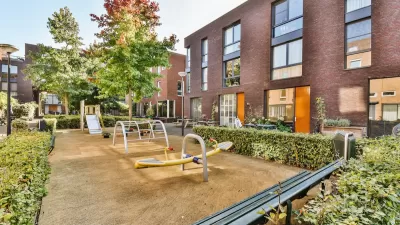With the Millennial boom in many urban centers, many cities are looking for ways to retain young families rather than losing them to the traditional suburban exodus. One columnist dares to ask: Do cities even need kids?
If you've ever wanted to read sentences like "Children: Are they necessary?" in a non-Onion, national media platform, now's your chance. A new article, written by Lydia DePillis for The Washington Post, asks if designing and building child-friendly cities is more trouble than it's worth.
DePillis cites a 2001 study that quantified the burden of children compared to benefit of the singles: "Back in 2001, two scholars at the Brookings Institution put a price tag on that dichotomy. A two-parent family with two kids costs $6,200 annually, and a childless couple generates a net gain for the city of $13,000."
Then there are the negative consequences on inequality once wealthy families decide to stay in the city: "Professional families will only move to a neighborhood if they’re assured a spot in a quality school — but that locks out those who can no longer afford it." Successful schools, it seems, are a harbinger for gentrification.
The column includes more details on the arguments for why children can be so troubling to a city's bottom lines, and a policy recommendation from DePillis.
FULL STORY: It’s hard to build cities for kids. But do they really need them?

Alabama: Trump Terminates Settlements for Black Communities Harmed By Raw Sewage
Trump deemed the landmark civil rights agreement “illegal DEI and environmental justice policy.”

Planetizen Federal Action Tracker
A weekly monitor of how Trump’s orders and actions are impacting planners and planning in America.

The 120 Year Old Tiny Home Villages That Sheltered San Francisco’s Earthquake Refugees
More than a century ago, San Francisco mobilized to house thousands of residents displaced by the 1906 earthquake. Could their strategy offer a model for the present?

In Both Crashes and Crime, Public Transportation is Far Safer than Driving
Contrary to popular assumptions, public transportation has far lower crash and crime rates than automobile travel. For safer communities, improve and encourage transit travel.

Report: Zoning Reforms Should Complement Nashville’s Ambitious Transit Plan
Without reform, restrictive zoning codes will limit the impact of the city’s planned transit expansion and could exclude some of the residents who depend on transit the most.

Judge Orders Release of Frozen IRA, IIJA Funding
The decision is a victory for environmental groups who charged that freezing funds for critical infrastructure and disaster response programs caused “real and irreparable harm” to communities.
Urban Design for Planners 1: Software Tools
This six-course series explores essential urban design concepts using open source software and equips planners with the tools they need to participate fully in the urban design process.
Planning for Universal Design
Learn the tools for implementing Universal Design in planning regulations.
Clanton & Associates, Inc.
Jessamine County Fiscal Court
Institute for Housing and Urban Development Studies (IHS)
City of Grandview
Harvard GSD Executive Education
Toledo-Lucas County Plan Commissions
Salt Lake City
NYU Wagner Graduate School of Public Service





























